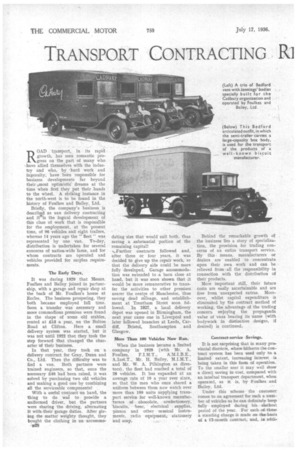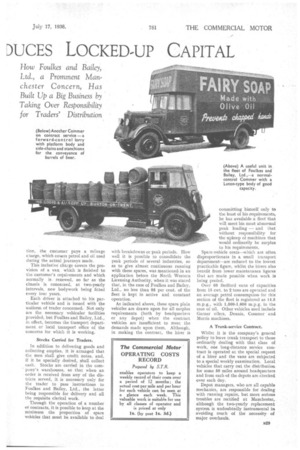TRANSPORT CONTRACTING RI
Page 38

Page 39

If you've noticed an error in this article please click here to report it so we can fix it.
XiCES LOCKED-UP CAPITAL ROAD transport, in its rapid growth, has seen romantic progress on the part of many who 'have allied themselves with the industry and who, by -hard work and ingenuity, have been responsible for business developments far beyond their Imost optimistic dreams at the time when first they put their hands to the wheel. A striking instance in the north-west is to be found in the history of Foulkes and Bailey, Ltd.
Briefly, the company's business is described as van delivery contracting and the logical development of this class of work that is responsible for the employment, at the present time, of 96 vehicles and eight trailers, whereas 14 years ago the " fleet" was represented by one van. To-day, distribution is undertaken for several concerns of nation-wide fame, and for whom contracts are operated and vehicles provided for surplus requirements.
The Early Days.
It was during 1920 that Messrs. Foulkes and Bailey joined in partnership, with a garage and repair shop at the back of Mr. Foulkes's house at Eccles. The business prospering, they both became employed full time. Soon a transfer was necessary and more commodious premises were found in the shape of some old stables, rented at a year, on the Bolton Road at Clifton. Here a small delivery system was started, but it was not until 1922 that they took the step forward that changed the character of their business.
In that year, they took on a delivery contract for Gray, Dunn and Co., Ltd. Then the difficulty was to find a van. Both partners were trained engineers, so that, once the necessary 40 had been raised, it was solved by purchasing two old vehicles and making a good one by combining all the serviceable components!
With a useful contract on hand, the thing to do was to provide a uniformed driver, but the partners were sharing the driving, alternating it with their garage duties. After giving the matter weighty thought, they bought the clothing in an accommo
dating size that would suit both, thus saving a substantial portion of the remaining capital!
-,Further contracts followed and, after three or four years, it was decided to give up the repair work, so that the delivery side could be more fully developed. Garage accommodation was extended to a barn close at hand, but it was soon shown that it would be more remunerative to transfer the activities to other premises nearer the centre of Manchester, thus saving dead mileage, and establishment at Trentham Street soon followed. In 1927, a local delivery depot was opened in Birmingham, the next year came one in Liverpool and later followed branches at Leeds, Cardiff, Bristol, Southampton and Glasgow.
More Than 100 Vehicles New Rim.
When the business became a limited company in 1928 (with Mr. A.
Foulkes, F.I.M.T., A.M.I.B.E., A.Inst.T., Mr. H. Bailey, M.I.M.T., and Mr. W. A. Pilkington as directors), the fleet had reached a total of 28 vehicles. It has expanded at an average rate of 10 a year ever since, so that the men who once shared a uniform between them now watch over more than 100 units supplying transport service for well-known manufacturers of chocolate, confectionery, 'biscuits, beer, electrical .supplies, pianos and other musical instruments, radio equipment,. stationery and soap. Behind the remarkable growth of the business lies a story of specialization, the provision for trading concerns of an entire transport service. By this means, manufacturers or dealers are enabled to concentrate upon their own work and can be relieved from all the responsibility in connection with the distribution of their products.
More important still, their future costs are easily ascertainable and are free from 'unexpected extras. Moreover, whilst capital expenditure is eliminated by the contract method of working, the advantage of the trading concern enjoying the propaganda value of vans bearing its name (with bodywork in distinctive designs, if desired) is continued.
Contract-service Savings.
It is not surprising that in many provincial districts, where hitherto the contract system has been used only to a limited extent, increasing interest is being taken in this form of operation. To the smaller user it may well show a direct saving in cost, compared with an internal transport department, when operated, as it is, by Foulkes and Bailey, Ltd.
Under this scheme the customer comes to an agreement for such a number of vehicles as -he-can definitely keep fully employed during -his. sleekest period of the year. For each of these a standing charge is made on theleesis of a 12-moath contract, and, in midi
tion, the customer pays a mileage charge, which comers petrol and oil used during the actual journeys made.
This inclusive charge covers the provision of a van, which is finished to the customer's requirements and which normally is renewed, so far as the chassis is concerned, at two-yearly intervals, new bodywork being fitted every four years.
Each driver is attached to his particular vehicle and is issued with the uniform of trader concerned. Not only are the necessary vehicular facilities provided', but Foulkes and Bailey, Ltd., in effect, becomes the transport department or local transport office of the concerns for which it is working.
Stocks Carried for Traders.
In addition to delivering goods and collecting empties, it is arranged that the men shall give credit notes, and, if it be specially desired, shall collect cash. Stocks are carried in the company's warehouses, so that when an order is received from any of the districts served, it is necessary only for the trader to pass instructions to Foulkes and Bailey, Ltd., the latter being responsible for delivery and all the requisite clerical work.
Through the operation of a number of contracts, it is possible to keep at the minimum the proportion of spare vehicles that must be available to deal with breakdowns or peak periods. How well it is possible to consolidate the peak periods of several industries, so as to give almost continuous running with these spares, was mentioned in an application before the North Western Licensing Authority, when it was staled that, in the case of Foulkes and Bailey. Ltd., no less than 95 per cent, of the fleet is kept in active and constant operation.
As indicated above, these spare plain vehicles are drawn upon for all surplus requirements (both by headquarters or any depot) when the contract vehicles are insufficient to meet the demands made upon them Althougl in making the contract, the hirer 's
committing himself only to the least of his requirements, he has available a fleet that will meet his most abnormal peak loading — and that without responsibility for the upkeep of machines that would ordinarily be surplus to his requirements.
Spare-vehicle costs—which are often. disproportionate in a small transport department—are reduced to the lowest practicable figure, whilst the hirers also benefit from lower maintenance figures that are made possible when work is being pooled.
Over 60 Bedford vans of capacities from 15 cwt. to 2 tons are operated and an average petrol consumption. for this section of the fleet is registered as 14.5 m.p.g., with 1,500-1,600 m.p.g. in the case of oil. Other vehicles used include Garner oilers, Dennis, Commer and Morris machines.
A Trunk-service Contract.
Whilst it is the company's general policy to leave trunk transport to those ordinarily dealing with that class of work, one long-distance service contract is operated at the special request of a hirer and the vans are subjected to a special weekly examination. Local vehicles that carry out the distribution. for some 50 miles around headquarters and from each of the depots are checked over each day.
Depot managers, who are all capable mechanics, are responsible for dealing with running repairs, but more serious troubles are rectified at Manchester,. although the two-yearly replacement system is undoubtedly instrumental in avoiding much of the necessity of major overhauls.




















































































